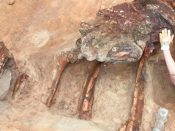Por Ana M. Bianco & Graciela Boente (Universidad de Buenos Aires & CONICET, Argentina).
The receiver Operating Characteristic curve (ROC curve) is a graphical tool that assesses the accuracy of a classification method based on a continuous random variables, usually known as the marker. Nowadays it is a well–accepted technique to reflects how well this classifier discriminates between two different groups or classes.
In this talk, our focus will be in situations where some covariates with impact on the performance of the ROC curve are registered so it is advisable to incorporate this additional information into the study. We take account the covariate effect through regression models. More precisely, for each population, the markers distribution is modelled separately in terms of the covariates and just after, the induced ROC curve is computed. The motivation of this talk is the extended belief that ROC curves are robust. Our talk tackles the concept of robustness in the sense of protection against anomalous data in the sample. Aware of the impact that outlying values may have on the diagnostic test accuracy, we center our attention on the robust aspects of the estimation procedures of the conditional ROC curve. Moreover, since regression models are involved in both the direct and induced approaches, atypical data among the responses or the covariates may severely affect the estimation methods.
To achieve robustness is even more complex when dealing with functional data, since, in such a situation, different types of atypical data may arise.
Due to the lack of stability of the classical ROC curve estimators, when there are outliers between observations, we will introduce a procedure to obtain robust estimators within the framework of the induced methodology. The proposal is based on a semiparametric approach in which for each sample a regression model is robustly fitted to the marker and estimators of the distribution functions of the adaptive errors are considered to down-weight large residuals. Robust procedures will be introduced both when there are real covariates and functional covariates.
We will present results regarding the uniform consistency of the estimators. The finite-sample numerical study illustrates the robustness of the proposal. A real data set is also analysed.
The methods to be described are based on the following papers.
Transmissão via Zoom.





















